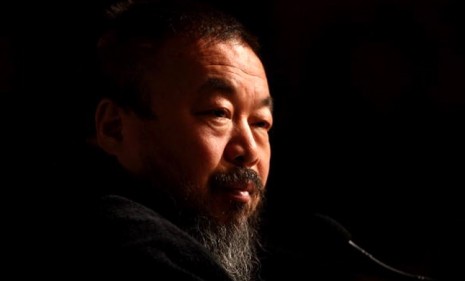China stamps out the Jasmine Revolution: A return to 1989?
Officials detain a prominent Chinese artist and activist, drawing comparisons to the brutal aftermath of the Tiananmen Square protests

A free daily email with the biggest news stories of the day – and the best features from TheWeek.com
You are now subscribed
Your newsletter sign-up was successful
China is reacting to the unrest in the Middle East with its most brutal crackdown on dissidents in decades. Chinese authorities have rounded up more than 50 lawyers, activists, and intellectuals in recent weeks. This weekend, they made their most prominent arrest yet — that of Ai Weiwei, a renowned artist and activist who helped design the "Bird's Nest" Olympic Stadium in Beijing. He has not been heard from since Monday. "Things are very strict right now," said political analyst Jin Zhong, quoted in the Los Angeles Times. "It is the most serious it has been since 1989." Could the situation get worse?
If Weiwei is a target, anyone could be: This crackdown was already "the harshest in at least a decade," says Austin Ramzy at TIME. "But Ai's detention takes it to a new extreme." With the exception of Nobel laureate Liu Xiaobo, Weiwei is "China's most prominent dissident." His fame had, for so long, been a shield against this kind of detention. "By holding him, the Chinese authorities are reminding the nation that no challenger to the rule of the Communist Party should feel safe."
"Not another day in the life of Ai Weiwei"
The Week
Escape your echo chamber. Get the facts behind the news, plus analysis from multiple perspectives.

Sign up for The Week's Free Newsletters
From our morning news briefing to a weekly Good News Newsletter, get the best of The Week delivered directly to your inbox.
From our morning news briefing to a weekly Good News Newsletter, get the best of The Week delivered directly to your inbox.
China has taken a step backwards: Far from respecting the rule of law, says The Economist, China now "dismisses the idea that one function of the law is to defend people against the arbitrary exercise of state power." It has denied foreign journalists the use of the law as a shield, and is increasingly resorting to "information detentions, punishments, and disappearances which are completely outside the law." Anyone who thought progress was possible in China did not count on its "vindictive rulers."
The 'Big Chill' could burn China: Unlike Egypt or Tunisia, China is a "rare creature: a high-functioning dictatorship," says Evan Osnos in The New Yorker. No dissident has been able to overcome the ability of the authorities to terrify people away from organized unrest. Still, the "real damage" of China's "Big Chill" could be to its international stature. "Names which have been heretofore unknown to the world will soon become cause célèbre" — and the world might sit up and take notice.
A free daily email with the biggest news stories of the day – and the best features from TheWeek.com
The U.S. must register its disapproval: With this latest crackdown, says Kelley Currie at The Weekly Standard, China is devolving into "lawless thugocracy." And yet, the U.S. government is still intent on building ties with the country's leaders. We ought to cancel or postpone all diplomatic missions to China until we and our allies come up with a "coordinated strategic response to Beijing's descent into totalitarianism." We can't ignore it any longer.
-
 Film reviews: ‘Send Help’ and ‘Private Life’
Film reviews: ‘Send Help’ and ‘Private Life’Feature An office doormat is stranded alone with her awful boss and a frazzled therapist turns amateur murder investigator
-
 Movies to watch in February
Movies to watch in Februarythe week recommends Time travelers, multiverse hoppers and an Iraqi parable highlight this month’s offerings during the depths of winter
-
 ICE’s facial scanning is the tip of the surveillance iceberg
ICE’s facial scanning is the tip of the surveillance icebergIN THE SPOTLIGHT Federal troops are increasingly turning to high-tech tracking tools that push the boundaries of personal privacy